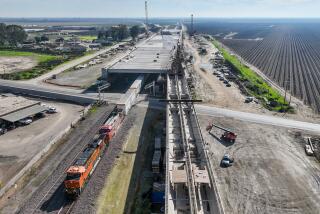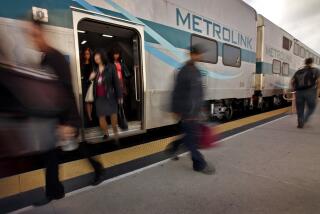Metrolink Is Back on Track, Says State Audit
Metrolink, the fast-growing commuter railroad that replaced its executive director and put two top managers on leave several months ago, has reduced costs and increased on-time performance, according to a new state audit released Wednesday.
The audit shows that Metrolink, which serves six Southern California counties, reduced its hourly operating costs by 13%, and costs per passenger by 10% from 1995 to 1997. Over the same period, on-time performance increased from 87% to 94%.
“This indicates that we are on the right track as we enter 1999. Our performance indicators are good, and costs are going the way we want them to,” said Alex Clifford, a Riverside city councilman who chairs Metrolink’s board of directors.
As one of the fastest-growing railroads in the nation, Metrolink now serves more than 27,000 passengers a day in Los Angeles, Orange, Riverside, San Bernardino, San Diego and Ventura counties.
With an annual budget of $80 million, it runs 128 trains a day, stopping at 46 stations. Since it began operation six years ago, the commuter service has grown at a rate of about 1.1 million passenger trips a year.
To continue receiving funds under the state Transportation Development Act, the Southern California Regional Rail Authority--the agency that runs Metrolink--must audit its operations every three years.
The review by Applied Management & Planning Group in Los Angeles covered 1995 to 1997. It found that the cost per hour of operation dropped from $542 to $470, while the cost per passenger dipped from $11.94 to $10.72.
During the audit period, ridership increased 26% and the service provided rose by 30%.
“This decrease in costs per unit of service provided and consumed is especially noteworthy given a 3.3% inflationary increase during the same time period,” auditors said.
The review, however, showed a decline in safety performance. The miles traveled between accidents and passenger injuries per 100,000 passengers dropped by 22% in 1996 and 50% in 1997.
Preliminary results for 1998 show that the decline in safety performance has been reversed, returning to the 1996 level, analysts said.
Although the state audit indicates that on-time performance improved from 1995 to 1997, more current Metrolink reports show that on-time performance during peak periods dropped during most of 1998.
The number of trains reaching their destinations within five minutes of their scheduled arrival dropped from 96% in January to 87% in August. Those reaching their destinations exactly on time dropped from 87% to 63% for the same period.
Clifford said conflicting schedules between freight trains and Metrolink have caused more delays for commuters than in the past.
Metrolink officials viewed the state audit as good news in the wake of a separate internal audit released in September that found a variety of problems with the agency’s management.
“We are not in trouble right now and the state audit confirms this,” said Peter Hidalgo, a Metrolink spokesman. “We are cost-efficient and well-run.”
In September, Metrolink replaced Executive Director Richard M. Stanger, who had guided the rail service through its formative stages. Two top managers, Marketing Director Adrienne Brooks-Taylor and Finance Director Wanda Hill, were placed on paid leave and have yet to return to work.
The shake-up coincided with a 56-page audit that characterized the agency’s leadership as ill-suited to guide the rail system to the next level of growth and prone to putting the agency at risk because of mismanagement.
Metrolink officials said many of the internal audit’s recommendations are now being reviewed and considered for implementation as part of an ongoing management review.
More to Read
Sign up for Essential California
The most important California stories and recommendations in your inbox every morning.
You may occasionally receive promotional content from the Los Angeles Times.










